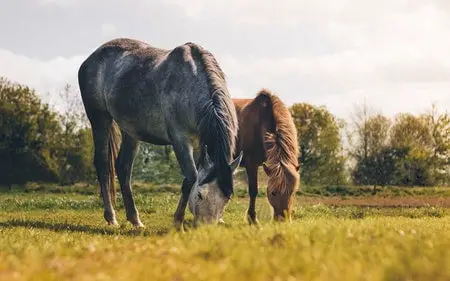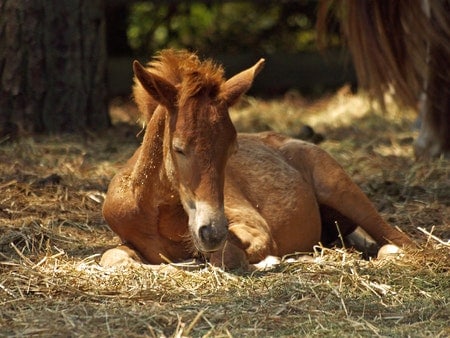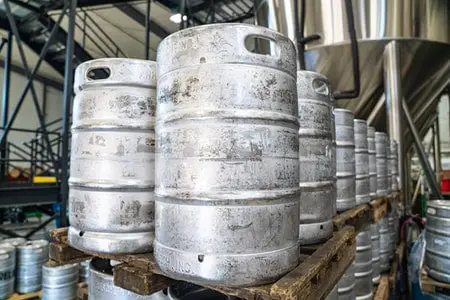There have been a significant as to whether beer helps in the treatment of colic. Some even go as far as to self-administer their horses with beer without proper research or seeking advice from equestrian professionals. Irrespective of how desperate you are, it is important that you do not take matters into your hands by giving your horse beer to treat colic and leave it at that. Seeking out your veterinary professional should be the first course of action.
Below, we will look at helping you understand the condition – colic. We’ll also look at if it is safe to give horses beer if they have colic.
Colic
Before looking at whether beer helps with colic in horses, let’s understand the condition itself. We’ll look at the main causes and types, symptoms/signs, prevention, and treatment.
What is Colic?
It is important to note there are different kinds of colic with a few varying symptoms. As such different kinds of treatment are often required.

Colic can be described a condition where a horse suffers from abdominal pain which can be caused by a variety of reasons. Colic is a severe sickness, its surgery is quite complicated and sometimes horses even die from colic.
There are a lot of factors that can lead to colic. Below are a few;
- Sand intake
- Dental disorders
- Distress
- Parasite infestation
- Worm
- Gas
- Dehydration
- Impaction
- Twisted intestine
Impaction – It is the consumption of harmful or dangerous materials which may lead to blockage in the abdomen.
Parasite Infestations – Parasites like strongyles may cause the development of colic in a horse, it is necessary to perform deworming exercises regularly.
Dental Disorders – Dental problems can cause colic if the horse experiences difficulty in chewing its food. The horse can then swallow a large amount of air in between chews.
Twisted Intestine – Twisted intestine when it occurs is usually problematic and often requires surgery. It happens when one of the horse’s intestines gets tangled and twisted up resulting in extreme loss of blood.
Symptoms Associated with Colic
Colic symptoms vary from horse to horse, where one horse may suffer due to loss of appetite, another may roll on the ground incessantly with agonizing pain. This makes it difficult to ascertain if there are colic symptoms. That’s why we have to monitor our horse’s behavior like why he is refusing to feed or a sudden dullness or agitation.
With that being said, let’s examine some of the symptoms of colic in horses;
- Dullness
- Pawing
- Agitation
- Swishing of tail
- Loss of appetite
- Rolling
- Bloating
- Gut sounds are absent
Types of Colic
Different types of horses can have any of the different types of colic that exist. These include displacement colic, impaction colic, gas colic, and spasmodic colic. I will briefly explain the different types of colic and head on to our central thought.

Let’s hop right into it:
Displacement Colic
The small intestine hangs in the ventral (abdominal cavity) by the mesentery which enables it to swing freely in the gut. This makes it susceptible due to its free movement and it could get twisted. Like I said earlier, twisted intestine is complicated and requires surgery to restore the intestine to its former position. Care should be taken while performing an intensive abdominal surgery.
Impaction Colic
This is when the large intestine gets wrapped up (folded) and alternates its directions (flexures) and diameter. These convolutions arise because of impactions where the horse has ingested harmful substances blocking the intestine and the cecum. Materials that may cause impaction include sand or other foreign objects.
Gas Colic
Gas builds up in the stomach and also in the intestines. As the gas gets intense, the gut expands resulting in severe abdominal injury. The high amount of gas is caused by the production of bacteria in the gut after the consumption of heavy grains and other food supplements. A special type of tube is inserted into the horse’s stomach to reduce the excessive gas and fluid augmentation in the stomach.
Spasmodic Colic
This can be defined as hurtful compaction of the muscle in the intestine.
Does Beer Help Colic in Horses?
Now let’s get this straight. If you think your horse has colic, the first thing you should do is call a veterinarian doctor for diagnostics and treatment, do not act rashly and endanger the well-being of your horse. Now that I have said that, here’s what I found about using beer to treat horses suffering from colic.
Spasmodic colic is the type of colic that may bring positive reaction in treating it with beer. This colic is caused by hurtful compactions of the muscle in the intestine. Dr. Paul Dunkel, a veterinarian was asked the same question and he described that horses that have spasmodic colic when treated with beer seems to produce a positive reaction, he added “that he would never advise someone to give the horse beer and leave it at that”.

Other types of colic do not bring a positive effect if treated with beer.
While beer may work with horses that have spasmodic colic, this does not necessarily give you the option to leave your horse to suffer without seeking medical advice from professionals and experts.
Does Colic Kill Horses?
Well yes, colic can kill horses, especially if you don’t notice it on time. When some horses have colic, it can be brutal and ultimately result in the death of horses. It is good you catch the symptoms on time and call your veterinarian for immediate treatment.
Treatment
To undergo treatment for colic in horses, it is important that you understand the cause and since it is difficult to do so, you have to consult your veterinarian for proper treatment of the disease. Before your veterinarian comes, you can do the following:
- Limit access to feeding, because if there is an impaction the condition will only get worse.
- Try to avoid giving your horse any medication if you haven’t consulted your veterinarian.
- Unless completely necessary, avoid forcing your horse to walk especially if it’s impaction colic. Although walking your horse helps relieve pain if it is gas colic, but you may never know unless your consult your veterinarian.
If your vet comes he may bring certain tools like fluids, laxatives, tubing tools, and others to treat your horse on the farm unless your horse suffers from a twisted intestine or displacement, in that case immediate surgery is required.
Prevention
Take preventive measures to prevent or reduce the occurrence of this terrible ailment horses suffer. The preventive measures are easy to comply with, below are some of them:
- Clean water should be provided for your horses.
- Walk your horses regularly.
- Avoid letting your horses from feed directly from the soil surface, this will prevent sand consumption.
- Deworm your horses regularly.
- Prepare a schedule for feeding your horses.
- Do not be too quick to change your horse’s diet.
- And, most of all practice good sanitation habits at all time.
Final Words
Once you’ve noticed that your horse is in distress, you should call your veterinarian doctor for treatment, do not take matters into your hands and endanger your horse by acting and treating your horse with home remedies. The key thing to be aware of is that, you won’t know the type of colic your horse is suffering from without calling your veterinarian.
It is also key that you remember to try your best to maintain a good sanitation habit around your farmhouse and/or stable.
Best of luck!

